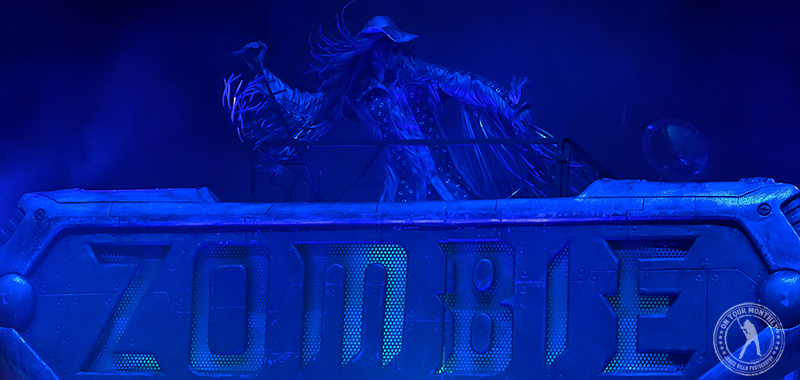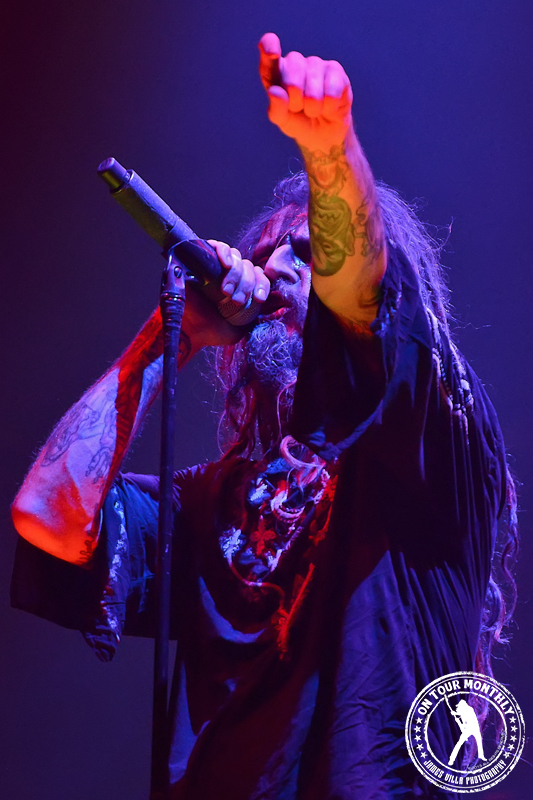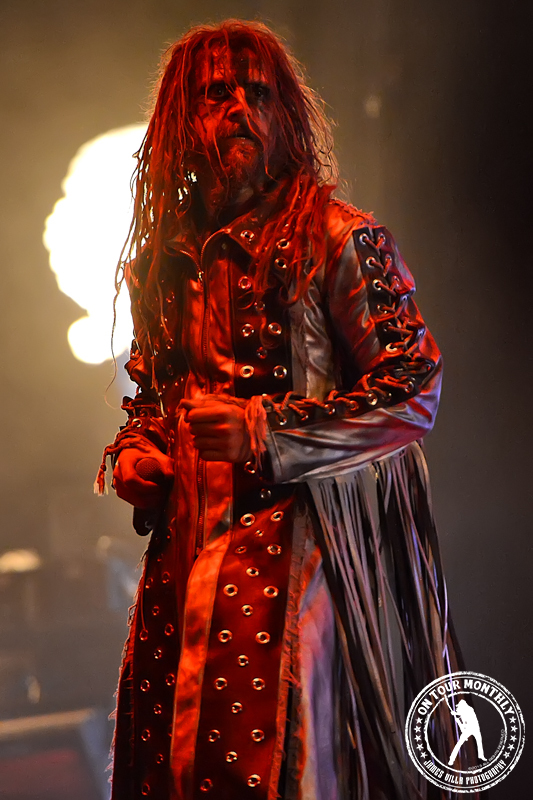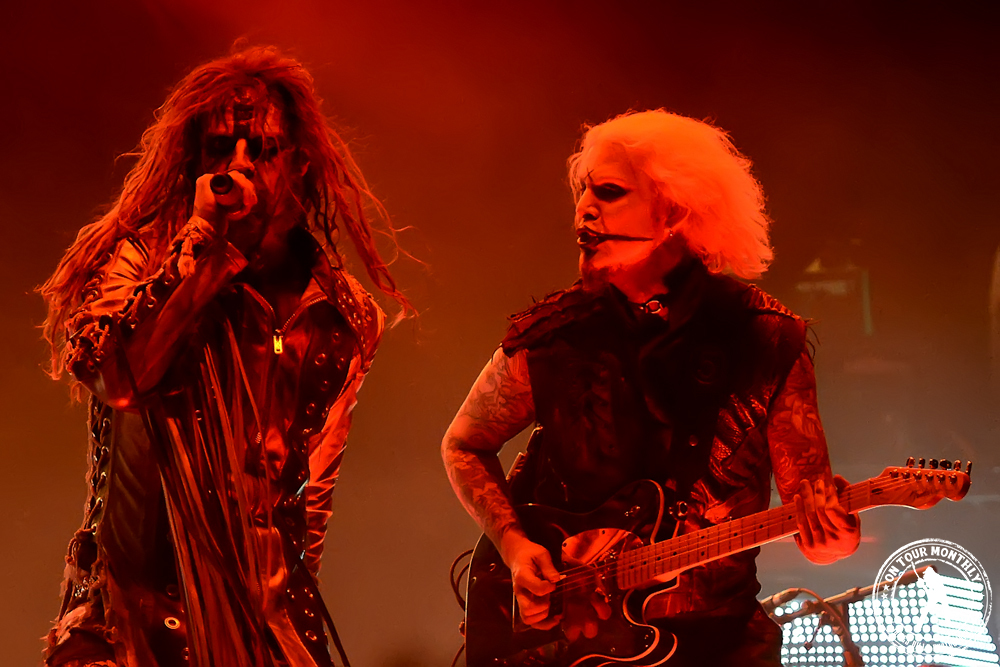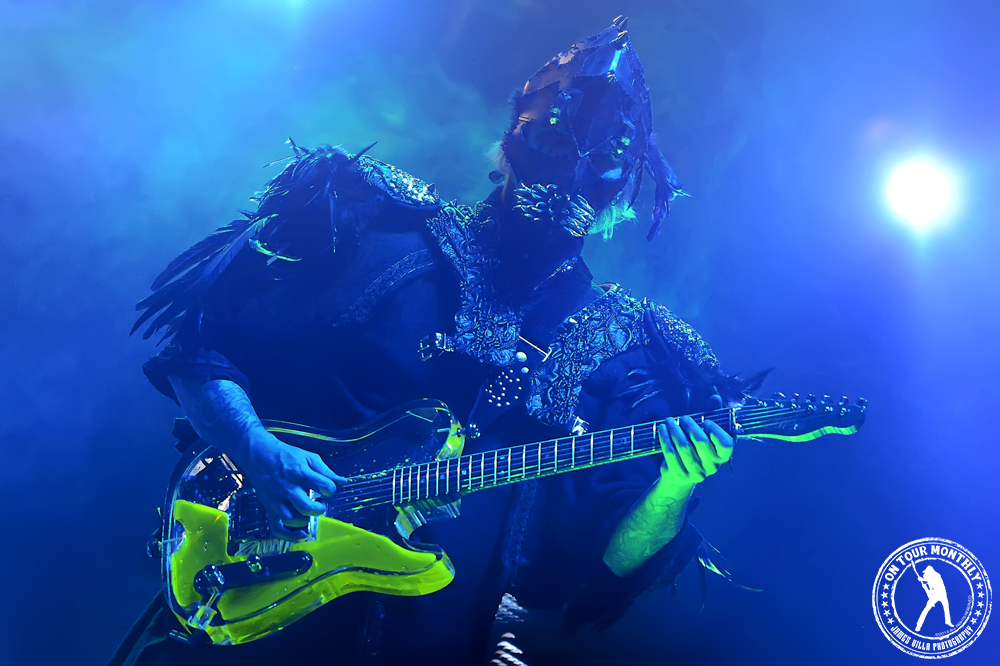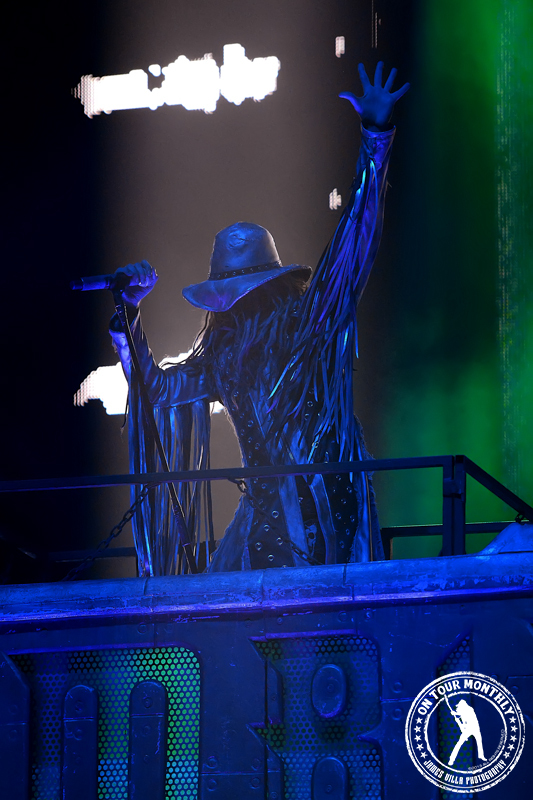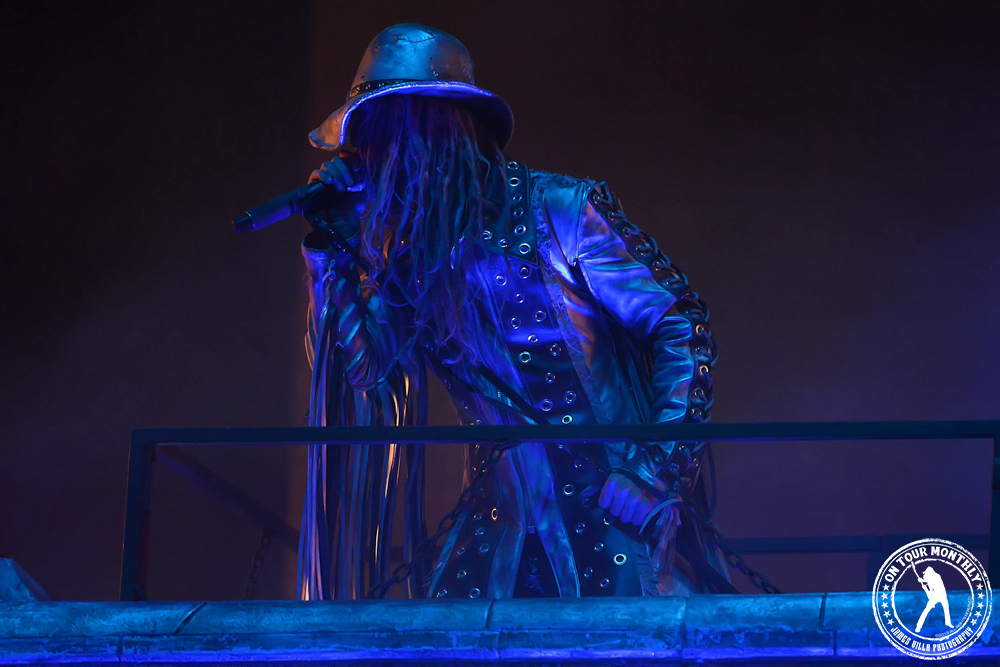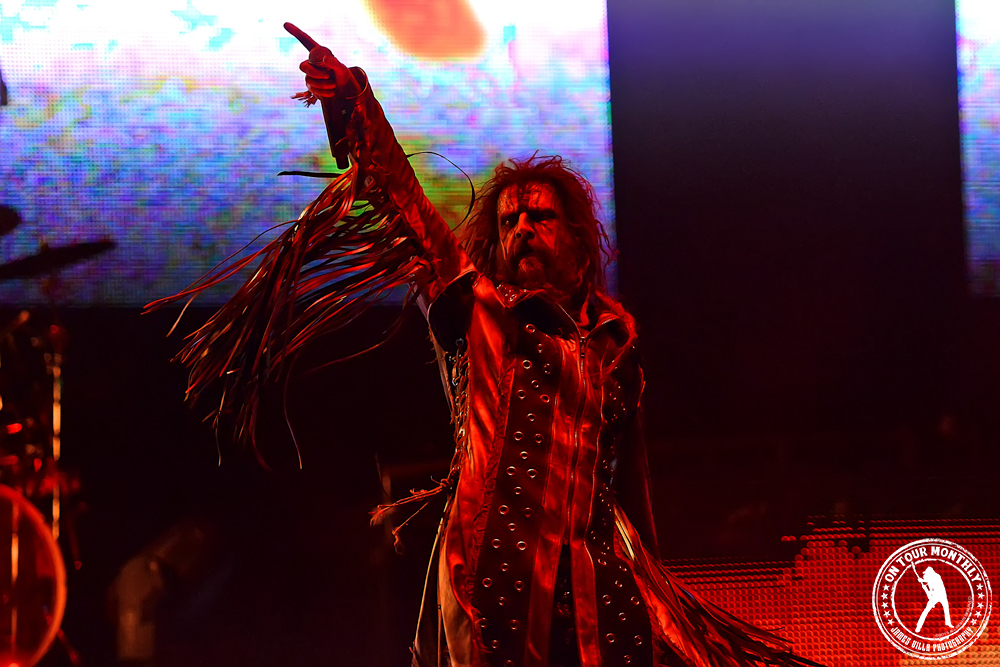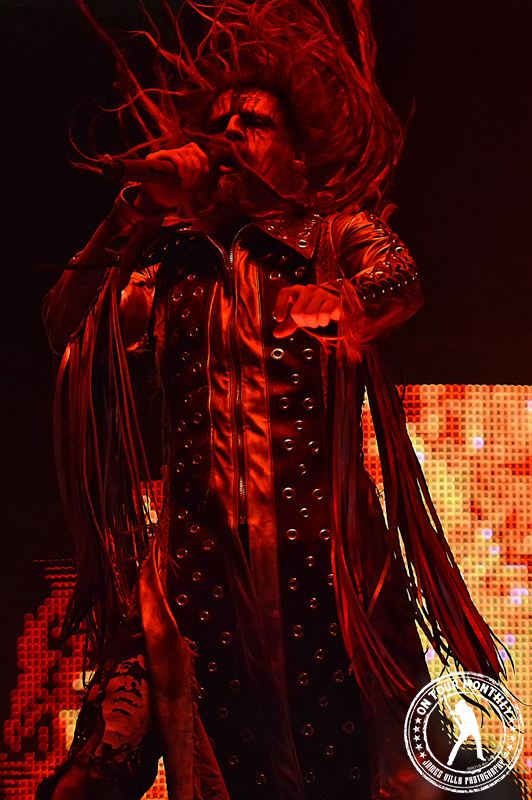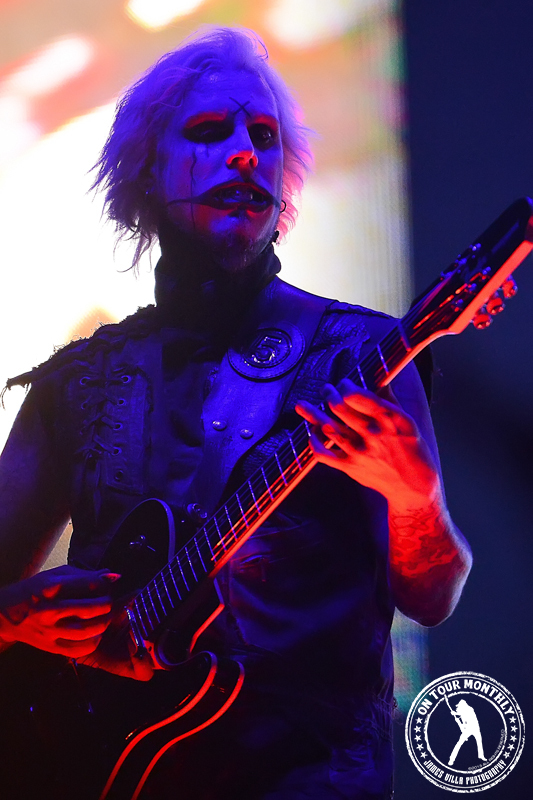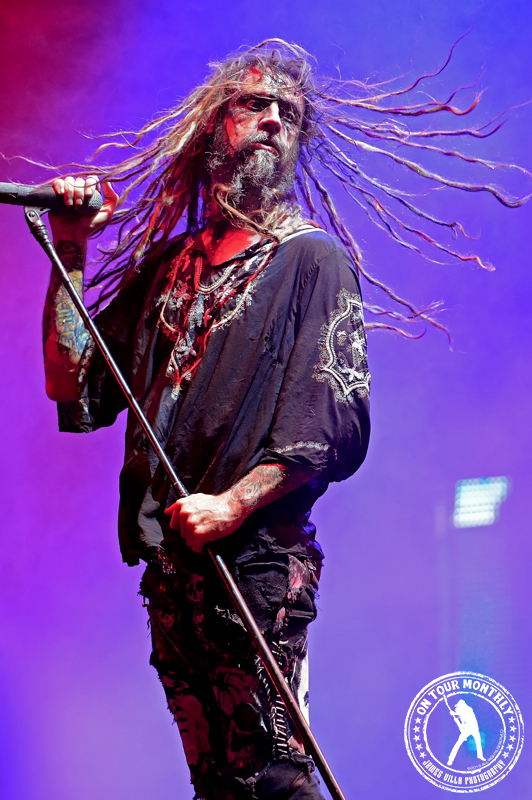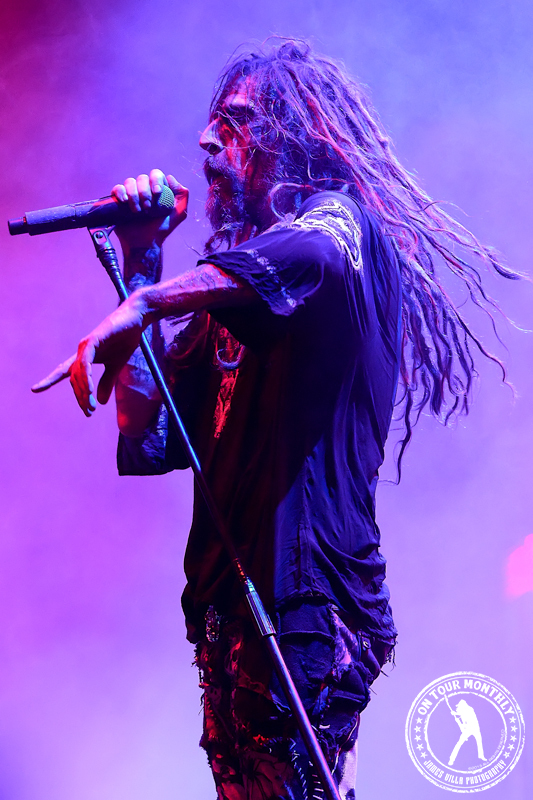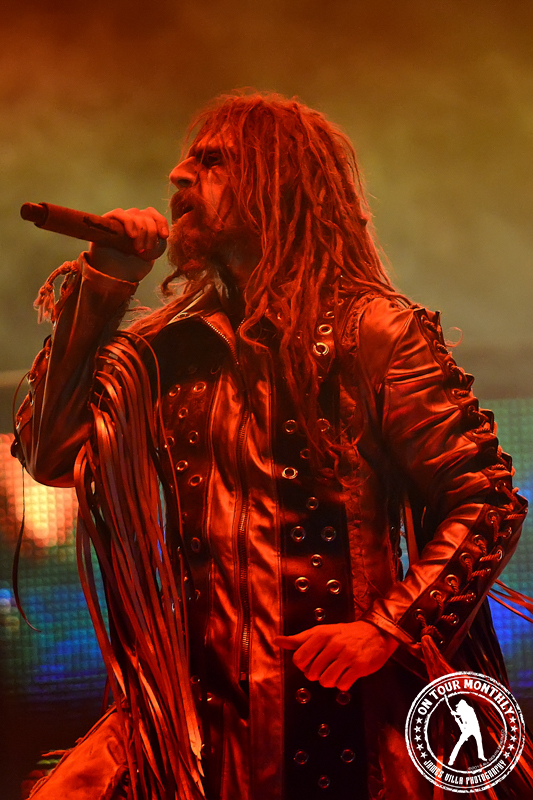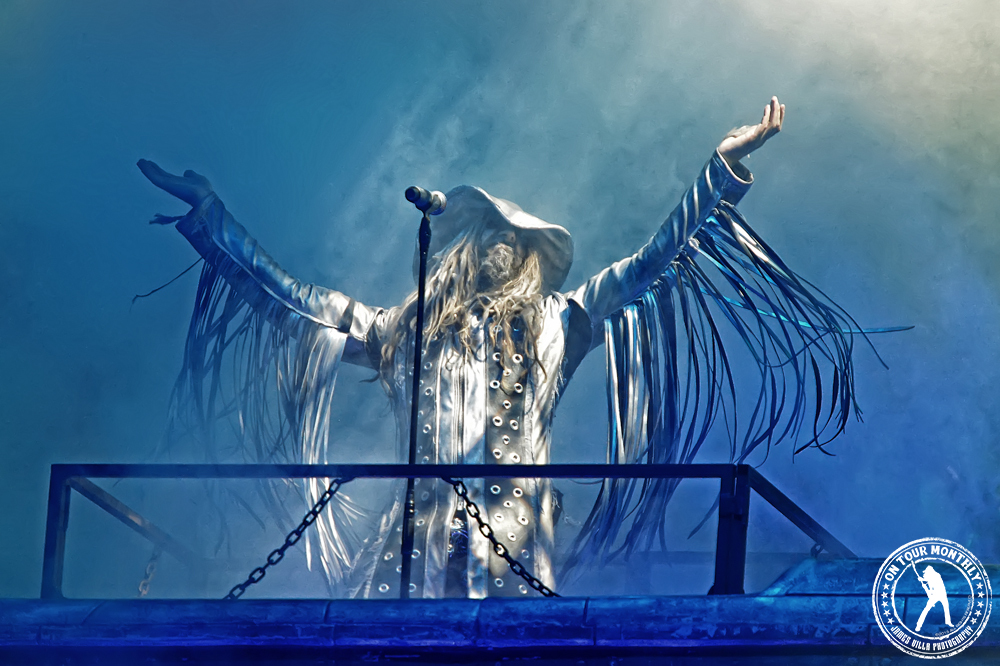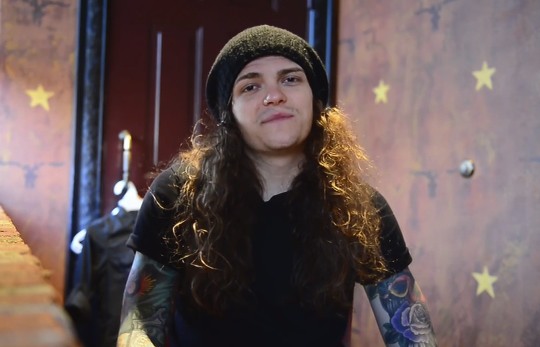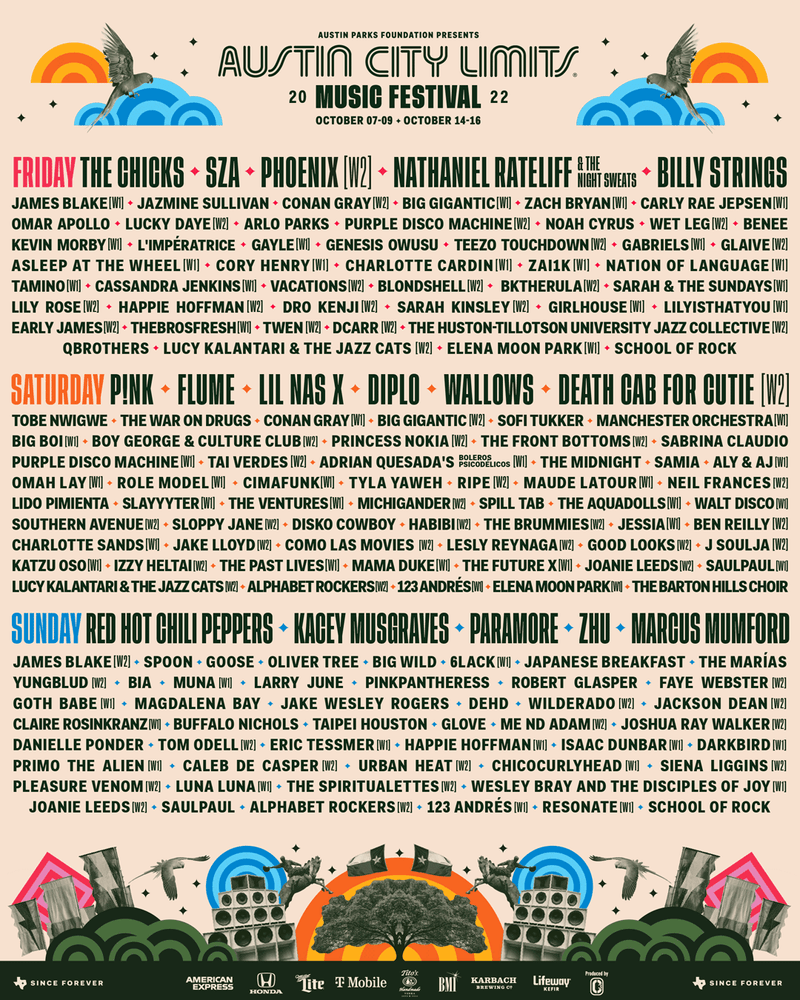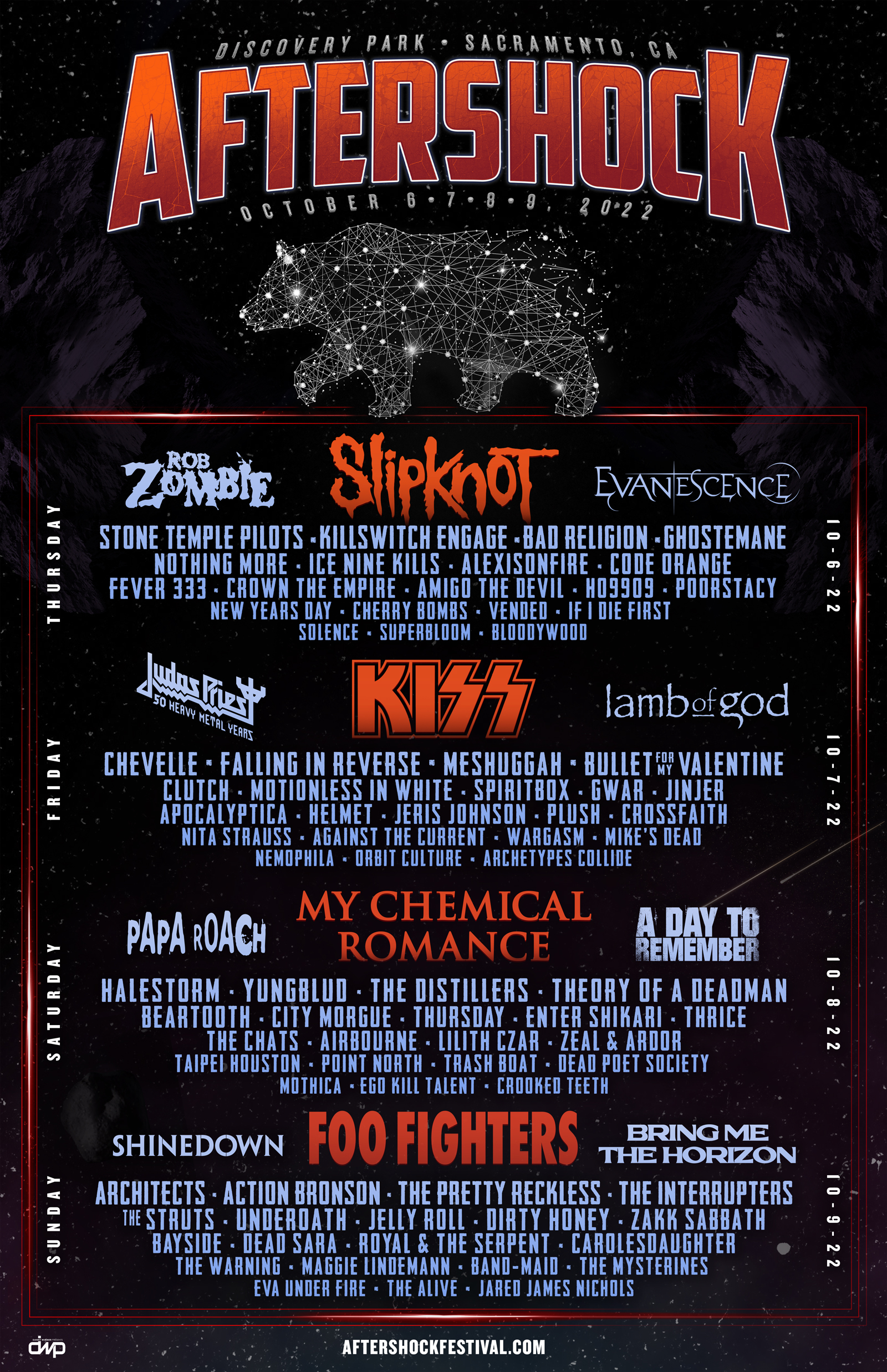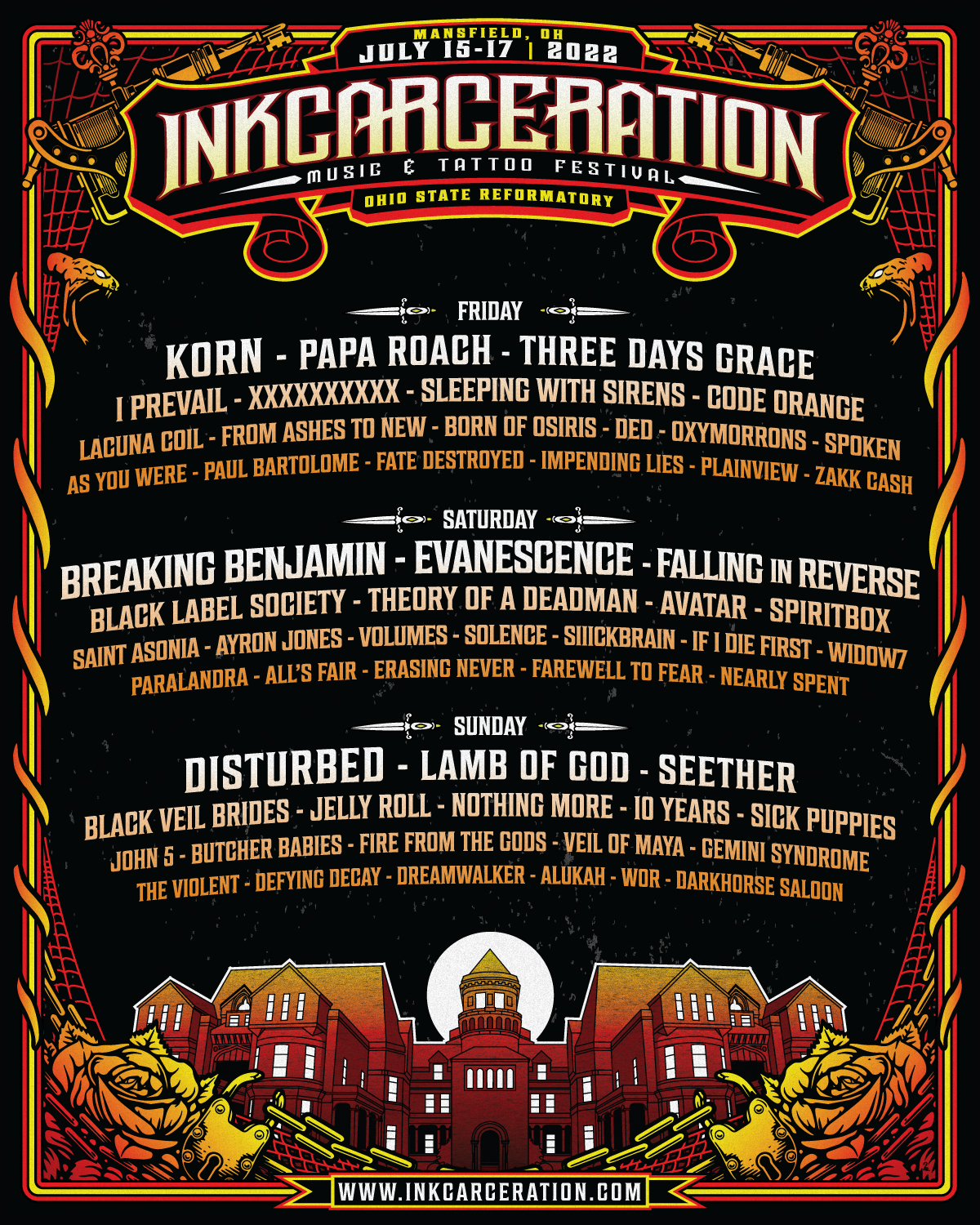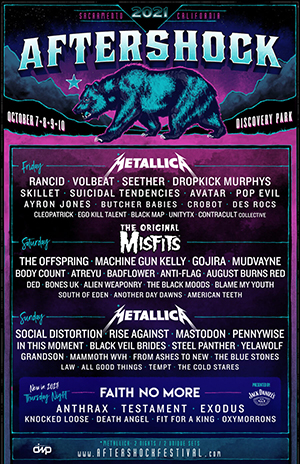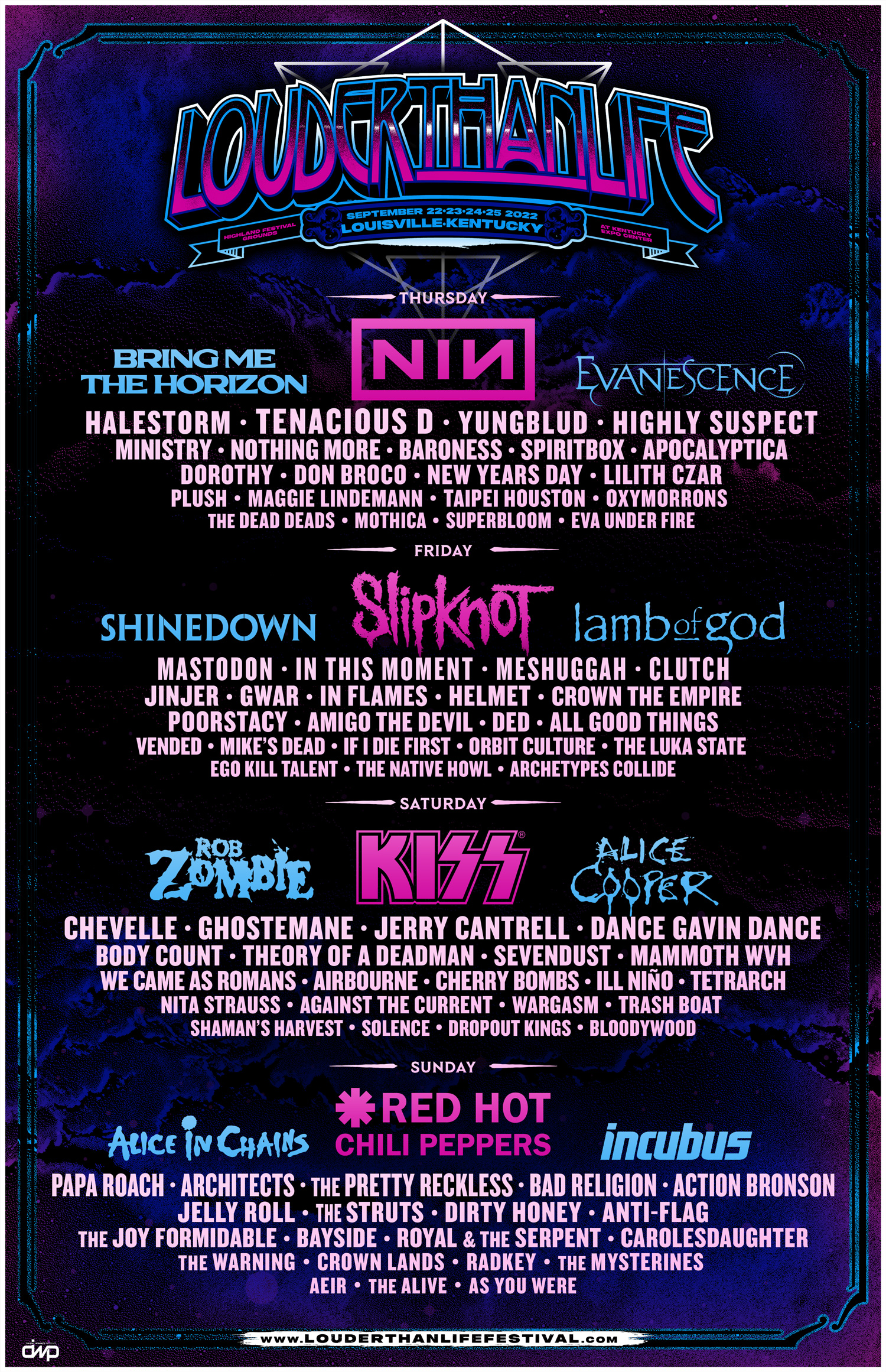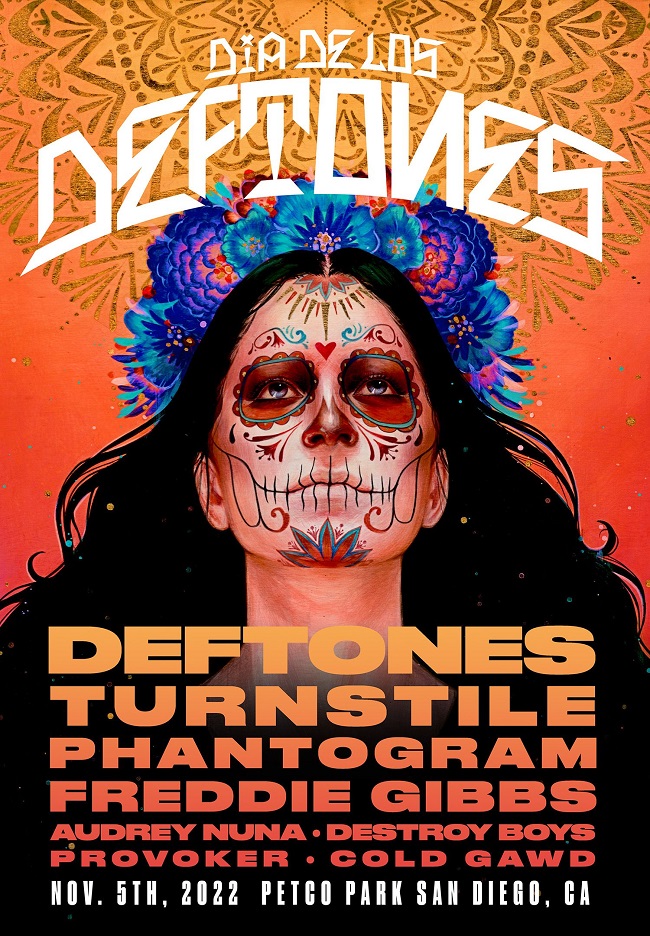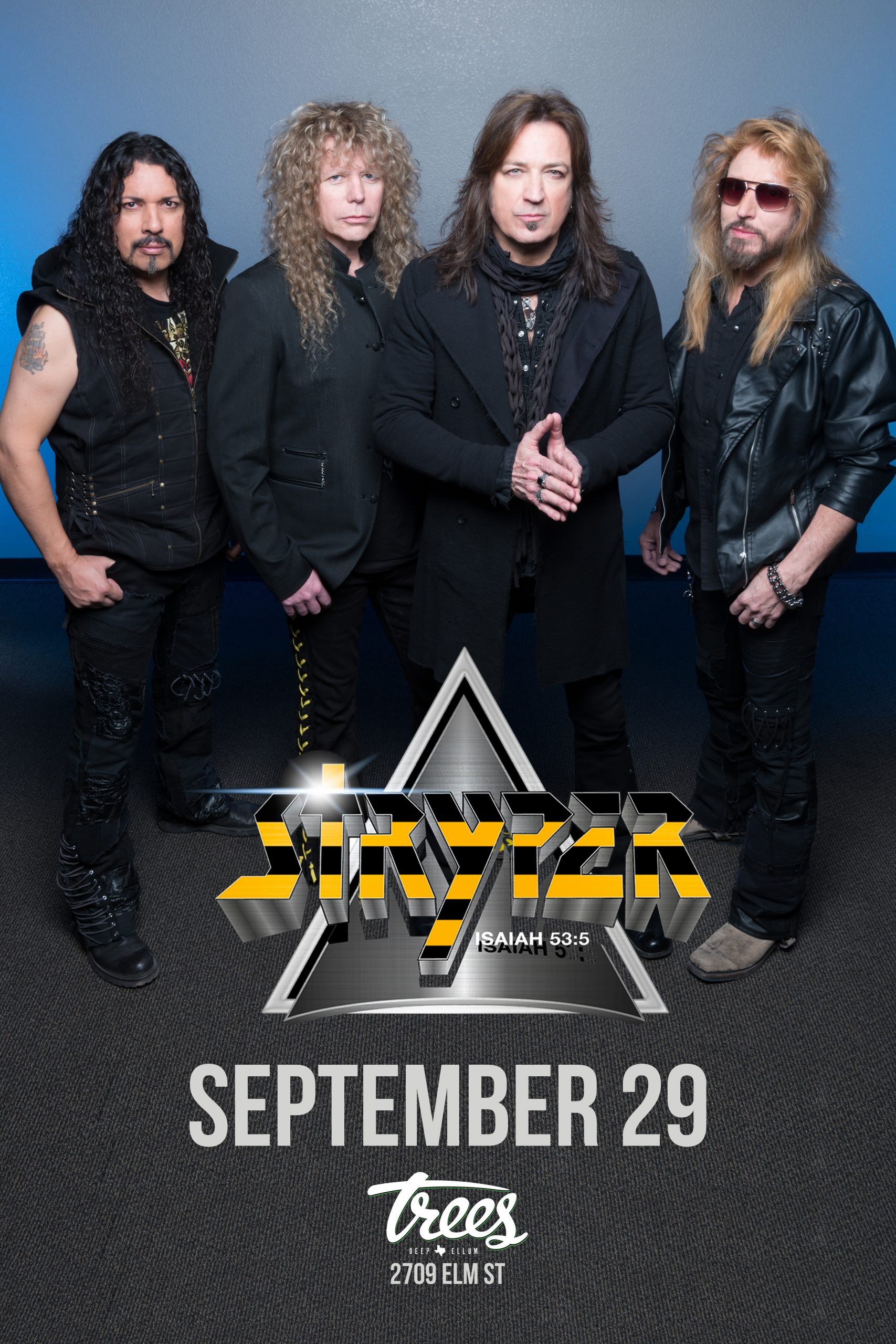– Interview by David Huff / Photos by James Villa –
“The Venomous Rat Continues its Musical Rampage”
Robert Bartleh Cummings, better known by his legal name, Rob Zombie, has created quite an impressive resume for himself the past 25 years. Most people know him as a rock star, film director and horror enthusiast. Though the musician first rose to prominence as the founding member of White Zombie in the 1980’s, the singer has really found his voice as a solo performer. To date, he has released four studio records, five compilation albums and a live recording. The 47-year old has also expanded his artistic endeavors to include the motion picture industry where he has written, directed and produced several horror films. Oh yes, and let’s not forget the numerous comic book brands he’s created as well.
Rob Zombie has had a profound effect on American culture, both among the Evangelicals whom he makes nervous, and among the counter-culture whom he inspires. He has also avoided drug and alcohol abuse, and though his albums are often laced with graphic imagery, his music for the most part of is devoid of profanity. This colorful musician has survived the music business for two reasons. He understands the nature of the beast, and two, he’s learned to diversify his portfolio.
Rob Zombie has survived the music business for two reasons. He understands the nature of the beast, and two, he’s learned to diversify his portfolio. Currently on tour with Korn supporting his latest incarnation of musical mayhem, The Venomous Rat Regeneration Vendor, the show is drawing near capacity crowds throughout the fruited plain. Zombie’s multimedia production is complete with oversized LED screens constantly showing a collage of monster film clips, a giant robot shooting flames from its body, and of course the band itself. Is this the greatest touring show on earth? Don’t bet against it.
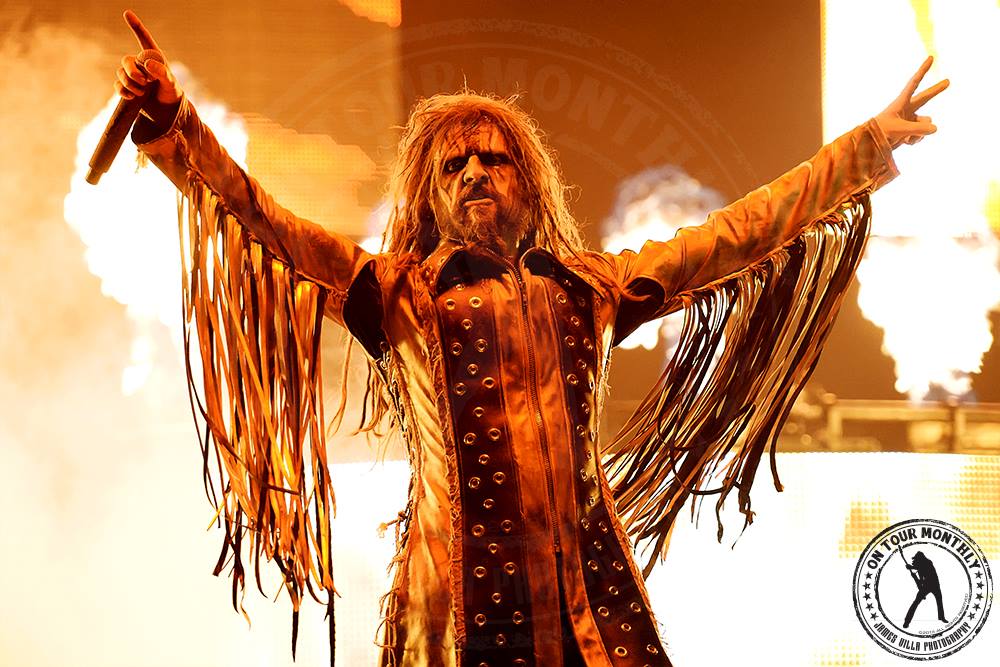
ON TOUR MONTHLY: You told me years ago that the music business is so fluid you were never concerned with record company turnover or consolidation. You’ve been with Geffen longer than any of the employees currently at the company. That’s more than ironic.
Rob Zombie – I know, it’s kind of weird and funny when you think about it. I feel really bad for everyone that lost their jobs over the years. I liked a lot of the people I worked with and was always sad when they were let go. I have kind of insulated myself from the turmoil over the years in a real self-sufficient way. There’s really nothing that can happen at the label that affects me.
OTM: Is that one of the reasons you have used your creative talents in other areas of the entertainment industry?
A lot of artists become dependent on the one thing that broke them. I didn’t want that happening to me. When David Geffen sold out, the heart and soul of the company went with him. I realized I need to look beyond music because the music business was unpredictable. The movie industry seemed a natural fit. It also allowed me to wean myself from being totally dependent on music, especially with all the changes that have occurred in the industry. For instance, I have gone through more A&R people than I can count. There were even occasions where I didn’t even have one. I’m a real hand’s on person with everything I do. I hate to say this, but turmoil at the label probably worked to my advantage. Interscope is a great company. During the merger mania, of all the places to be, Interscope was probably the most artist friendly environment for someone like me to be at. It’s probably the most creative of the labels left standing.
OTM: You were given relative freedom to do what you wanted when you went solo without interference from Geffen in the early days. You seemed to thrive under the tumult that was going on around you.
Pressure was always there to produce, especially with Hellbilly Deluxe. It would have been incredibly naive on my part to think otherwise. When a label gives you money to make a product, they expect a return on that investment. It’s as simple as that. I never had any false illusions that, “Oh, these people are my friends. They’d never get rid of me.” A record company loves you when you’re selling records and they couldn’t give a shit about you when you don’t. That’s just life in the music business. It’s never been any different.
OTM: You have literally overseen every single aspect of your musical career since you started White Zombie in 1985. Your last two albums with the band had really started the ball rolling for the group. Then you called it quits. Exactly what troubled you about the White Zombie incarnation that literally forced your hand to start over again?
The personalities in the band had slowly degenerated over the course of the 13 years we were together. White Zombie stayed together a lot longer than most bands hang in there. Also, people just change. When you are 18 years old and start a band, you grow up and change as a person. After 13 years and four albums, everyone wanted different things. It wasn’t fun anymore to be in White Zombie.
OTM: What I never could figure out was this. You finally have put White Zombie on the rock and roll map after years and years of struggle, then one day it’s over and you’re like, ‘Hey, it’s no big deal.’ It was a big deal.
You know, having the money come in, along with the success, didn’t make the band situation any better.
OTM: Does familiarity at times breed a contempt you just get tired of dealing with on a daily basis?
I think that situation had literally run its course. It’s difficult for bands to stay together for really long periods of time. We entered a period where our creativity just came together and it clicked with the public. We made two really good records, but what you are failing to understand is the fact we were burned out on each other. A lot of bands stick out those situations and end up making crappy record after crappy record. It isn’t any fun. People have always asked me, “When do you know it’s over?” I always know it is over when what you’re doing stops being fun. That’s when it is really over.
OTM: There are some great bands in rock that have been able to endure through the years, survive the cycles of change that occur within the industry, even if they have had to change out parts of the band to move forward. U2, Aerosmith, the Red Hot Chili Peppers and Metallica come to mind. Their musical approach was to create a new plateau for their music to perch on. Why didn’t you adopt that approach with White Zombie?
It really wasn’t a musical thing. It was personalities in the band. I’m not going to name names.
OTM: Hell, there’s only two – Sean and Jay.
Let me put it to you this way. Even band’s in bars that stand and smile together, probably can’t stand each other back stage. Who the hell knows what’s going on? All I know is I didn’t feel like doing it anymore with everybody.
OTM: The music business is so uncertain nowadays, once you have created a successful entity that took you years to build, it almost seems silly to start over again. Change can almost be destructive instead of constructive. Did you weigh those two factors when you made the decision to say good bye to 13 years of your life?
At the time, it was insane to do something like I did. People remarked to me during that period that what I was doing was not a smart thing. You work forever to make one thing happen. The chances of it happening twice are pretty slim, especially at the moment when the White Zombie records were selling really well. , and the next one you can really cash in and get the big money you can of build towards. But I didn’t care. No guts, no glory.
OTM: As the creative force behind everything you do, are you not sometimes too hard on yourself in your quest for a musical nirvana.
I think everyone is their harshest critic. A lot of people would go, “Oh no! It’s great! Don’t worry about it.”
OTM: Vince Lombardi once stated that perfection is not attainable, but in chasing it, you could catch excellence. It makes a lot of sense.
Yes it does. I don’t think you’ll never make anything perfect because every time you finish one thing, you can see the next level on the horizon. In general, that’s the nature of art of any kind, you know, trying to obtain some goal you can’t obtain. If I ever felt that I made the perfect album, and I could never do anything better, I would quit the music business because what would be the point. Basically, you’ve stated that it’s all downhill from there.
OTM: Has it been important for you to create a synergy between entertainment and music when you compose albums?
Yeah, I don’t see any difference between entertainment and music. What other purpose for music is there?
OTM: Some people want it to have an emotional value rather than an aesthetic one. When you get down to it, that’s why videos became an important factor in music in the ’80s, to visually entice people to get involved with a song?
I basically think of music as being entertainment, and if you get other things from it, great. If it can teach you something, or you can feel something, that’s all bi-products of being entertained. Music starts with the amusement factor first. It doesn’t matter what group or song you’re talking about either. If music isn’t enjoyment to you, you’ll just shut it off.
OTM: I know the White Zombie thing ended long ago, but I think it’s important for people to understand why you felt you just had to move on. It’s still hard for me to believe that Astro Creep 2000 was the apex of your musical odyssey with White Zombie. Did its success create problems that caught you off guard?
Not really. You know, to say anything negative now is like all the other people in the band, blah, blah, blah. I think that when you gain a measure of success, and separation happens, then the personalities involve change and it makes looking at the future harder.
OTM: Back then, you were called “a hero to every fucked up kid in America.”
No, I think that would have been Stone Cold Steve Austin.
OTM: Why was drummer John Tempest a holdover for you when the group thing ended and you went solo?
Basically he was new coming into the White Zombie thing. The two of us didn’t have a long history where things could go wrong. Between Sean, Jay and John, we were the best of friends.
OTM: You understood when Jay joined the band that he would stick it out with you no matter what.
Yeah I know. It just didn’t happen.
OTM: Explain this statement for me. “I don’t want to have ideas for things that can’t be done, just because other people aren’t into it. And I didn’t want to make records for money, which is what it would have turned into.”
I was talking about the past going into the future. I don’t want to not do something because one person in the band says that will suck. That’s like not doing what’s best for the project, you’re doing something to please everyone’s ego, and that’s the most annoying aspect of being in a band to me.
OTM: You know, when you say you’re “the man” in a band, are you really “the man.”
Yes, and I don’t mean that egotistically either. .Listen, maybe I made enemies within the band because I couldn’t let anything happen that I didn’t think was right. I don’t know if it’s just because I cared so much. If I heard or saw something that I didn’t think was right for White Zombie, it would make me feel sick and I’d go crazy. It had to be just right for me, and unfortunately, it wasn’t.
OTM: Was any of the music on your solo debut, Hellbelly Deluxe, held over from any sessions that were to appear on the Astro Creep follow-up?
Yes and no. None of the actual music existed previously, but pretty much anything I brought to Hellbelly is what I would have brought to White Zombie. I don’t know what that is exactly, but this was the next record I was going to make one way or the other.
OTM: You kind of went missing in action after the Astro Creep 2000 tour with White Zombie. For a musician to take five years between album projects is akin to career suicide because the music business changes so much. Did you purposely put that much distance between White Zombie and yourself so there would be no confusion on your fans part when you debuted as a solo artist?
First off, that last tour with White Zombie went on for almost two years. Then, for eighteen months after the tour, I was working on a movie that never happened. So right there you’re looking at three and a half years after the release of Astro Creep. At that point it was like, “I’ve got to make a record.” Then there were problems with the band.
OTM: When you disbanded White Zombie, did you make any pledges to yourself that certain things weren’t ever going to happen again.
The only thing I tried to make certain was this. Find the right combination of new people that were right for me.
OTM: Isn’t that kind of impossible? It’s like looking for perfection?
It is impossible, you’re right. However, here’s the thing. As the years go by, and you’re now working with your eighth guitar player or your fifth drummer, you get a better sense faster of what you need to create the musical landscape in your head. You can read someone’s personality quicker. It doesn’t take you a year to figure out that they are crazy.
OTM: The people you initially hired stayed with you for several years. Outside of Joey, what thought process did you follow in hiring Mike Riggs on guitar and Rob Nicholson on bass?
It had more to do with personality more than anything else. Of course they had to play, but that was like a given. The right attitude and personality are the two most important attributes I needed moving forward as a solo artist. I can tell when someone comes into a room whether or not they’d be cool to hang around with by the way they talk. That’s how I respond to people immediately. How a person communicates, whether it’s by talking with you, listening to what you have to say, or even jokes they tell you, all of its important when finding the right people to have in your band. If they’re bad it’s like, “I can’t be driving around with this guy in a bus for two years. He’s annoying as hell. I’d have to kill him.”
OTM: Did age and experience play a factor in the decisions you made?
No, actually both those guys are younger than I am, but not by much. Except for Joey, I had no idea how old Mike and Rob were when I asked them to join my band. I could just tell by the way they acted and carried themselves they’d be great to work with. I wasn’t looking for a younger perspective to flesh out the music I was creating. I wanted to find people that were enthusiastic about doing things. They were cool. It sounds like a bunch of crap, but it wasn’t.
OTM: Did you spell out a format they were going to have to follow?
I basically told them that this is what I want to do. If you guys want to do it with me, then tell me now. I don’t want you to waste my time or your own.
OTM: What was the initial vision you spelled out for them that you saw Rob Zombie creating?
I talked to them about the stage show, the music, the way I saw things. They knew about White Zombie, so they knew what I was talking about anyway. I didn’t have to spell it out that much. I have been around enough musicians and people to where you can tell when they aren’t going to work. I could tell in a few seconds if somebody wasn’t going to cut it.
OTM: Why did you just not keep the name White Zombie?
I couldn’t for two reasons. One, this project wasn’t White Zombie. Second, I couldn’t legally. The name was owned by a joint venture of Sean and Jay. You do things early on with people that sometimes come back to bite you. It’s alright for everyone to get a fair share if they are doing their fair share of the work. If they are not, and you still share everything, it will come back to bite you on the ass big time. I kept management intact, and the organization changed very little. The only thing different was the band.
OTM: Rob, you came out of the gate, literally, with lavish stage productions which you continue to create to this day. In this day and age, is it worth it?
Yes and no. For some bands, it’s a hard line to follow. In one sense, you are generating huge sums of money while you’re on the road. But here’s the thing. Say a tour generates $4 million dollars, but it cost you $3, 999, 999 to stage it.
OTM: When David Gilmour and Nick Mason toured as Pink Floyd back in 1987, the only person who made money was co-founder Richard Wright. He wasn’t a party to the lawsuit Gilmour and Mason had won against Roger Waters for the right to use the Pink Floyd name. He was a hired gun because it looked better to have the three original members on stage instead of two. The ensuing tour sold out, but Gilmour and Mason lost money because they took on the cost of the extravagant stage production themselves. Wright is the only one who walked away with a profit.
Believe me I hear what you’re saying. I can tell you that I put a lot of thought into my stage shows before taking them out on the road. The general public has absolutely no idea how much money is involved to actually take tours on the road. The more elaborate the production, the higher the cost.
OTM: Isn’t that your fault though?
It is and it isn’t. It’s really the fault of the whole industry. When kids go to a big rock show, they expect a BIG rock show. If they go to see Jewel, they expect to see her with an acoustic guitar and a spotlight. If I did that, kids would scream, “What they hell is this?”
OTM: You created your own monster, now you have to live with it?
In a sense, you could say I created my own hell, but it’s kind of the nature of this business. It’s the same thing with a movie star who’s known for action movies. You can’t make a decent action movie unless you spend at least $150 to 200 million filming it. People come to expect certain things at my shows, and it those things are expensive to take on the road. If they are not there, the audience is going to be bummed and might not come back. I’m not complaining boo-hoo about the money. It’s just the nature of it all. It’s expensive to take out a tour with all the production involved. There are crews, buses, hotels and other considerations that go into these shows night after night. Hell, even rock videos started getting insane with the prices directors wanted to charge. It’s hard to get them made for cheap anymore .They are extremely overpriced, and it’s hard to make them nowadays, even harder to get them played. Unfortunately, you still need them into today’s business world.
OTM: Could Rob Zombie play with a bare stage?
I could do it, and we have done that. We’ve played huge festivals where all we did was walk out on stage with our equipment and play. It’s not like I couldn’t do it, I just don’t think the audience would like it. There first reaction would be, “What the fuck!”
OTM: Has the downward cycles, consolidations and trends of the business made it difficult to keep Rob Zombie in the game, so to speak?
Nothing has ever been particularly easy for me. Music has always been hard work. Basically, by not ever being the hip thing at the moment, I have been unhip.
OTM: You are somewhat notorious for taking your time between album projects. For most acts, that would be tantamount to career suicide. You have gotten away with it?
Listen, of course people forget you fast in this business. I’m well aware of what you’re saying. I used to always keep track of the catalog sales of White Zombie records to see which albums were selling strong. The more records we sold of each succeeding album would tell me new kids were buying the product and were interested in what I was doing. You’re always hoping to attract both when you create a new record. The balance of keeping the two sides interested is something you really don’t have any control over. If you try to act hip with the new kids, you’ll end up making yourself a jackass. You kind of just have to do what you do. Your old fans that still like it will stick around. Ozzy is a good example of that. He has young kids that are just getting into him as well as the old fan base from 35 years ago.
OTM: Ever considered using outside writers to help flesh out ideas?
I haven’t considered doing it only because I haven’t ever been faced with, “Oh my, gosh! I’m out of ideas!” I’m not opposed to anything. It’s not like I don’t do it because I think it’s wrong or anything.
OTM: With all the consolidation going on in the music business, have you sat down with management about what’s going on?
The thing is I don’t care. Listen, don’t get me wrong, there’s no way not to, but what’s going on doesn’t affect my music. There’s nothing that takes place in the music business that could affect what I do. It never has and it never will. If a label ever told me I had to make a record a certain way, I’d say, “Yeah, right, thanks. Fuck you!”
OTM: Are you an entertainer more than a musician?
No, I consider it all art. From the first note of music we play on a record, to making a video or even building an elaborate set design to tour on, it’s just one big project for me. I don’t even know what to call what I do because basically I just do what I like. I never just change who I am for the sake of it.
OTM: Does anything influence those decisions?
No. I have pretty much been a withdrawn person since I was a little kid. I’m sure world events must seep into my mind subconsciously, but I never feel influenced by what’s going on in the world around me.
OTM: Are you a concept kind of guy?
There’s no theme for what I do. I have a very fragmented, scattered way of doing things in my brain. Conceptually, I don’t really plan out anything from start to finish because I go off in so many different directions. In the end, it just comes together. For the new people that are just working with me, it makes them crazy because it seems like the project is never going to get done, and what we’re doing doesn’t make any sense.
OTM: Are package tours necessary today?
Personally, I think they are, yeah! MTV and a lot of other factors have killed the business. Unless you go on the road with an overload of support, you’re not going to do the business anymore.
OTM: Speaking of MTV, can Rob Zombie even get on that cable station anymore? It has changed quite a bit.
MTV no longer follows the concept that originally launched the network. It’s all this Real World type shows and whatever reality crap they can come up with.
OTM: You did a Rolling Stone cover shot that was somewhat controversial at the time. Did you have anything to do with the concept? You look like a Charles Manson figure perched in that photo.
That cover was actually shot twice. The picture inside of me with the mummies, the pig’s head and the white contact lens , that was the original cover. When the editors at Rolling Stone saw it, they said, “No way! We just want a cover of you sitting there, and nothing else.” So, that’s what I did. I just basically went in dressed the way I was dressed, sat down, and they took a picture. The first photo took seven hours to put together. The second one was so basic, it was like when you have your picture taken in grade school. You go in, sit down, and you’re done. I didn’t do anything but sit there, that’s what they wanted. It was kind of a bummer.

